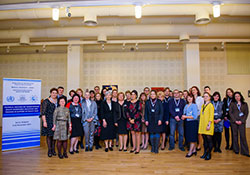South-east European countries begin shift towards transformative education for their health workforce

Varna Medical University
Preparing health professionals to meet the expanding health and social needs of ageing societies while enabling them to pursue rewarding career paths in their country of origin is a rising priority for governments in south-eastern Europe, whose health sectors have been weakened in recent years by external and internal migration. WHO/Europe, in collaboration with the South-eastern European Health Network (SEEHN) and the Medical University of Varna, Bulgaria, organized a high-level meeting on 9–10 November 2015 in Varna.
The aim of the meeting was to discuss strategies for strengthening the technical capacity of the region's health workforce through transformative education and solutions to the geographic imbalance.
WHO experts and representatives of health and education ministries, national public health institutions and universities from Albania, Bosnia and Herzegovina, Bulgaria, Croatia and the Republic of Moldova attended the meeting. It outlined the need for improved alignment between health workforce education and training curricula, and evolving professional competencies required by new models of health care and changing public health needs.
Participants discussed solutions to existing barriers to cooperation between the health and education sectors. They highlighted the need:
- to establish a systematic process for health workforce planning with shared responsibility between ministries of health, employment and finance;
- to shift towards evidence-based professional education and to retain faculty who can deliver it;
- to secure political support for enhanced teaching and training modalities; and
- to increase intersectoral cooperation by initiating policy dialogues on planned curriculum reforms with all stakeholders.
Vision of transformative education
The vision of transformative education includes development of competencies and skills – both through basic health workforce education and through continuing professional development – that are linked to nationally and contextually relevant needs, as well as to global standards of excellence. Such education aims to maximize the contributions of all health workers.
Translating this vision into practice is essential to implementing Health 2020, the European policy framework for improving the health of populations and reducing health inequities, in which health professionals play a central role. To operationalize this vision, countries need strengthened subregional collaboration, continued technical support and cooperation, and greater alignment between educational institutions and the systems responsible for health service delivery.
Commitment to build a sustainable health workforce
The meeting in Bulgaria followed the WHO regional expert consultations on transformative health professionals' education and training in support of Health 2020 and a series of subregional technical meetings on health workforce mobility and retention, which drew commitment by SEEHN members to build a sustainable health workforce responsive to the current and future health needs of their populations
.



